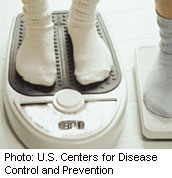Helps with weight loss, but therapy is costly and long-term results are unknown
MONDAY, Feb. 9, 2015 (HealthDay News) — Extremely obese adolescents in an intensive 10-month residential treatment program lost more weight than their counterparts, and appeared to reverse endothelial dysfunction that could lead to atherosclerosis, according to a new study published online Feb. 9 in Pediatrics.
Luc Bruyndonckx, M.D., Ph.D., of the University of Antwerp/Antwerp University Hospital, and colleagues tracked 24 girls and nine boys, with an average age of 15, for 10 months while they lived in a residential weight-loss facility. The researchers also tracked 28 similarly obese adolescents encouraged to reduce calories and exercise at home. By the end of the 10-month study, six children dropped out of the residential intervention and seven dropped out of the usual-care group. The children in the program were only allowed to eat 1,500 to 1,800 calories a day. They also had to participate in physical activity every day and get mental health support.
The obese children in the intervention program lost about 60 pounds. Meanwhile, children who received standard diet and exercise counseling gained more than 16 pounds. Weight, body fat levels, cholesterol levels, and blood pressure all improved in the children who took part in the residential program. Microvascular endothelial function also improved in the intervention group at 10 months.
A significant concern is the cost of the program. The researchers estimated that the residential program costs about $260 per child, per day. However, Bruyndonckx pointed out to HealthDay that obese adults are also expensive to society. “We do believe that there is a place for residential treatment for motivated adolescents and children with severe obesity” for whom regular treatment isn’t sufficient, he said.
Copyright © 2015 HealthDay. All rights reserved.








